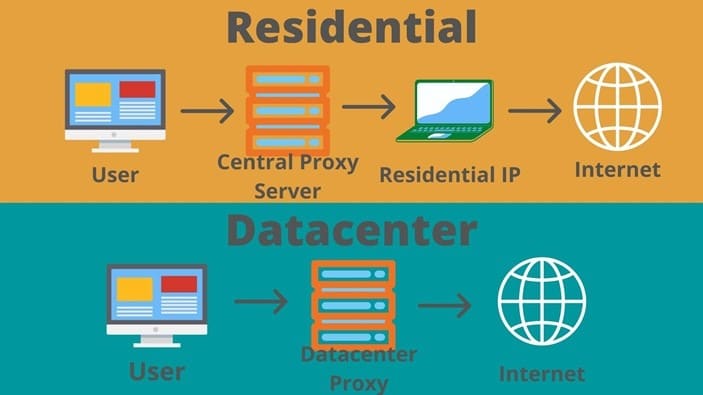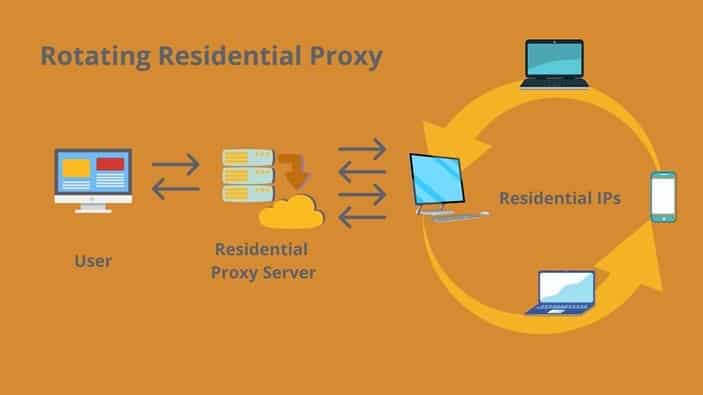Using the internet has become an essential part of our daily lives. Indeed, many of today’s businesses depend on it for their day-to-day operations. However, our daily online activities expose us to countless privacy issues and cyber attacks.
To overcome this problem, technology such as a proxy server was developed to offer users a safer way to explore and use the internet for commercial purposes.
Read on to know more about residential proxies and how you and your business can benefit from them.
What is a proxy?

A proxy acts as an intermediary server or middleman between a targeted webpage and an internet user requesting to extract or scrape data.
A proxy server safeguards your security and enhances your privacy as you carry on with your online activities. It conceals your identity by hiding your real Internet Protocol address and then assigning a different one to you.
Why are proxies getting blocked?
Bot traffic comprises over 40% of all internet traffic, in which a considerable amount of that portion is malicious software. For this reason, many site owners are looking to ban automated malicious activities.
Proxy usage is another reason why your residential IP address is getting blocked by target websites. You may have sent too many simultaneous connection requests.
What is a residential IP?
An Internet Protocol address is your online fingerprint that third parties use to track your physical location. Residential IPs are IP addresses tied to desktop devices and mobile phones. The real owners of residential IPs are Internet Service Providers (ISPs).
Residential Proxy Network Use Cases
▪ Web Data extraction
Wed data extraction and web scraping involve collecting website data to fetch pricing info, compare product data, strengthen sales intelligence, maintain the competitive advantage, scan public records, and more.
▪ Market Research
A residential proxy network allows you to gather and analyze data as you perform market research.
▪ SEO Monitoring and SERPs Tracking
Google and other search engines block corporate or datacenter IPs from snooping on target websites. Residential proxies can hide your IP address. You’ll appear as a genuine website user while performing SEO monitoring and SERPs tracking.
▪ Social Media Management (SMM)
Rotating residential proxies allow you to create multiple accounts on various social media platforms while avoiding account suspensions. Static residential proxies offer unlimited concurrent sessions, allowing you to carry out social media strategies as long as you wish.
▪ Price Comparison
Residential proxies help you stay on top of the pricing game by appearing as a regular website user or a potential customer. Target websites won’t serve you misleading information or block you since your IP address is not from a datacenter.
▪ Ad Verification
Rotating residential proxies will make it more difficult for fraudsters to feed you inaccurate data. You’ll be able to stop ad fraud right away and receive a good outcome for the ad verification process.
▪ Brand Protection
Using residential IPs for brand monitoring help ensure proper utilization of your brand’s assets and copyright content.
▪ Travel Aggregation
With residential IPs, gathering and comparing fare prices from any international web entity is a breeze.
Residential Proxies Vs. Datacenter Proxies

Both datacenter and residential proxies conceal your Internet Protocol address when you’re browsing the web. These proxies route internet traffic through intermediary servers.
Here are some of their differences:
▪ Speed
A proxy from a datacenter is faster than its residential counterpart. However, target websites could deny your connection request if you don’t randomize your scraping speed.
▪ Price
Proxies from datacenters are much cheaper than residential ones. A dedicated residential proxy can cost more than shared residential proxy.
▪ Bans
Proxies from datacenters often get banned as a consequence of massive concurrent requests while using the same IP. On the flip side, a residential proxy uses a unique residential IP address for each connection request.
▪ Web Scraping
A proxy from a data center works better for harvesting data, especially on unregulated sites. In contrast, residential proxies work well for regulated sites since these proxies use genuine IPs.
What is a datacenter proxy?
Proxies from data centers are not affiliated with any ISPs and have nothing to do with your internet connection. They are owned by universities, web hosting companies, and other Local Internet Registries (LIRs).
Pros
These proxies are known for their exceptional speed, performance, and cost-effectiveness.
Cons
A single IP is only allowed to make a specific number of requests per minute. Exceeding this limit could result in a ban. Therefore, this single proxy server setup can restrict your browsing options.
Your target website may block you if you try to scrape data, use scripts to automate your SEO or use bots for social media.
Luckily, residential proxies can effectively get around such difficulties.
What are residential proxies?
Residential proxies are IP addresses assigned by an internet service provider to the homeowners. Instead of a data center, residential proxies are issued by LIRs and ISPs, which include universities and network operators.
Moreover, residential proxies have their own:
- Preferred location
- Browser information and
- Cookies
Pros
- A lot harder to block since a unique IP is used with every connection request.
- Considered a legitimate connection since they are linked to a specific ISP and homeowner.
Cons
- Slower performance.
- More expensive than its datacenter counterpart.
What are rotating residential proxies?

A rotating residential proxy is one of the two types of residential proxies. The other type is the static residential IPS proxy, which conceals your real IP behind a different IP.
Rotating residential proxies hide your IP address behind a pool of IP addresses. Rotating residential IPs continuously change your IP address with each request.
What are proxies from internet service providers?
An ISP proxy has both datacenter and residential attributes. It offers faster performance and is immune from getting flagged for sending unlimited concurrent sessions. It also offers unlimited bandwidth since it comes from a data center.
Can you buy residential proxies?
Absolutely. You can buy residential proxies if you want to change your IP address to a different one. You’ll avoid bans and restrictions since you’re using a real person’s IP. Many proxy providers offer residential proxies at very affordable prices.
Final Thoughts on Residential Proxies
The potential for residential rotating proxies to reproduce requests like a real person through residential IPs can be beneficial for individuals and businesses.
If you want to enhance your online anonymity and security even further, the Chameleon browser is your best option. With it, you can securely browse the internet and control website tracking while doing SEO and social media marketing.












